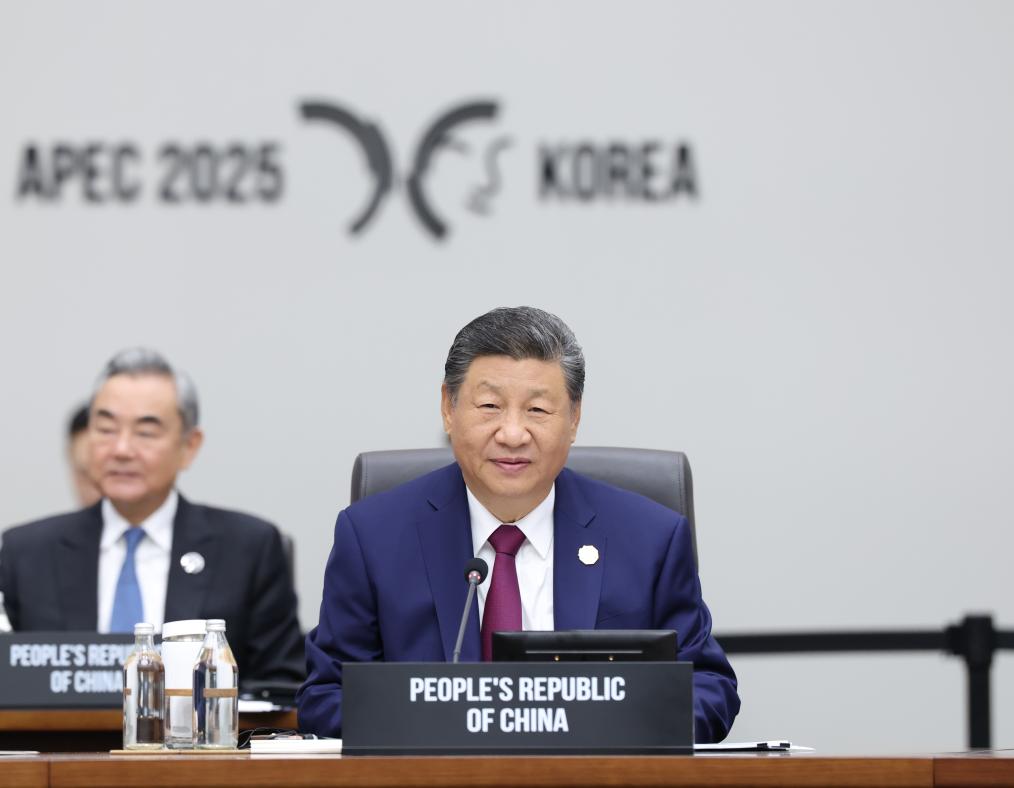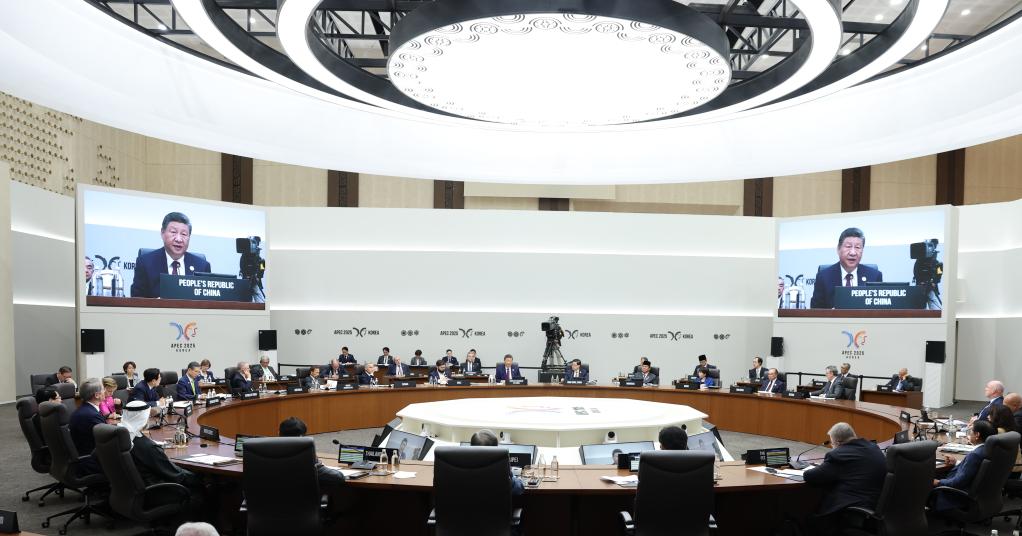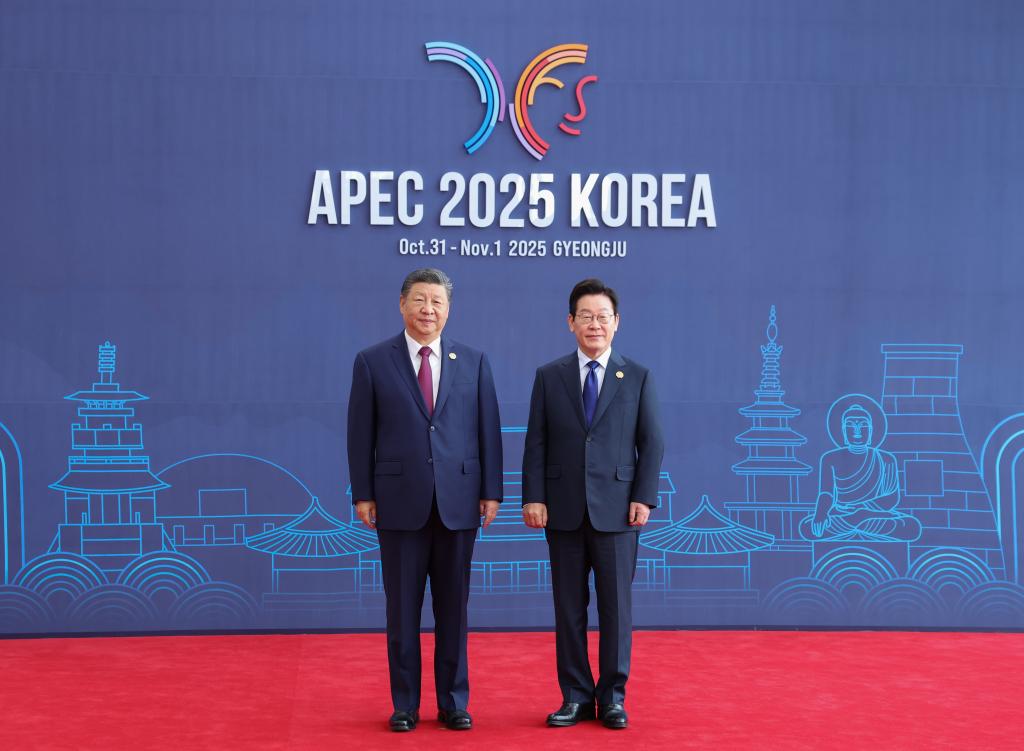
GYEONGJU, South Korea – Chinese President Xi Jinping on Friday put forward a five-point proposal for promoting a universally beneficial and inclusive economic globalization and building an Asia-Pacific community.
He made the proposal in his speech titled "Building an Inclusive Open Asia-Pacific Economy for All" at the first session of the 32nd APEC Economic Leaders' Meeting, which began on Friday with leaders gathering to seek stronger economic cooperation and chart a shared path toward a sustainable future.
Over the past 30-plus years since its founding, the Asia-Pacific Economic Cooperation has been spearheading the region's rise to the forefront of global open development, and has made the Asia-Pacific the most dynamic part of the global economy, said Xi.
Currently, changes unseen in a century are accelerating across the world, and the Asia-Pacific faces growing uncertainties and destabilizing factors in its development, he said, adding that the rougher the seas, the more the APEC members must pull together.
He called on APEC members to stay true to APEC's founding mission to promote economic growth and improve people's lives, and champion open development where everyone shares opportunities and emerges a winner.
FULL TEXT: Xi Jinping's remarks at Session I of the 32nd APEC Economic Leaders' Meeting
He also urged efforts to promote a universally beneficial and inclusive economic globalization, and build an Asia-Pacific community.
In first of his five-point proposal, Xi called for joint efforts to safeguard the multilateral trading system.
He urged APEC members to practice true multilateralism, enhance the authority and effectiveness of the multilateral trading system with the World Trade Organization at its core, and update international economic and trade rules to reflect the changing times, so as to better protect the legitimate rights and interests of developing countries.
Calling for building an open economic environment in the region, he urged APEC members to keep promoting trade and investment liberalization and facilitation, deepen fiscal and financial cooperation, steadily push for regional economic integration, foster mutual alignment and collaborative progress, so as to inject impetus into the development of the Free Trade Area of the Asia-Pacific.
RELATED ARTICLES
- Trip to give momentum to cooperation
- Xi Jinping — proponent of an inter-connected Asia-Pacific
- AI ties with APEC members in focus
In his third proposal, Xi urged APEC members to work together to keep industrial and supply chains stable and smooth.
APEC members should join hands rather than part ways, strengthen their links rather than sever them, vigorously expand common interests and support the open development of supply chains, strive for concrete and tangible results in physical, institutional, and people-to-people connectivity, so as to further consolidate the foundations for open development in the Asia-Pacific region, he said.
The Chinese leader called for advancing the digital and green transformation of trade.
He urged efforts to make digital technologies a strong catalyst for cross-border trade, remove various green barriers, and expand cooperation in green industries, clean energy and green minerals.

Urging the Asia-Pacific to work together to promote universally beneficial and inclusive development, Xi called for joint efforts to adhere to the people-centered development philosophy, focus on imbalances in development, and foster an economic globalization that is more inclusive, sustainable and beneficial to all peoples in the region.
China is working with various parties to promote the high-quality development of the Belt and Road Initiative, and is committed to common development and shared prosperity with all countries, he said.
Xi emphasized that China always pursues the basic state policy of opening up and has taken real steps to promote an open world economy.
Noting that the recommendations for formulating the 15th Five-Year Plan were adopted at the fourth plenary session of the 20th Central Committee of the Communist Party of China, he said that China will take this opportunity to further deepen reform comprehensively and expand high-standard opening up, and create new opportunities for the Asia-Pacific and the world through the latest achievements of Chinese modernization.

Guided by the theme "Building a Sustainable Tomorrow," this year's APEC agenda aimed to advance regional connectivity, spur innovation-driven growth, and create a more resilient future for the Asia-Pacific.
Chairing the 32nd APEC Economic Leaders' Meeting, South Korean President Lee Jae-myung said as the free trade order undergoes dramatic changes, global economic uncertainty is deepening, and trade and investment are losing momentum.
Calling for greater cooperation and solidarity in the region to overcome new challenges, he said: “We can join together for the ultimate goal of shared prosperity.”
Established in 1989, APEC has become a dynamic engine of economic growth and one of the Asia Pacific's most important regional forums.
Economic growth in the APEC region is projected at 3.1 percent in 2025, slightly higher than earlier estimates, according to the latest APEC Regional Trends Analysis. The upgraded forecast was supported by resilient trade and strong demand for high-tech goods, according to the report.
It, however, warned that growth could ease to 2.9 percent in 2026 as public debt rises and temporary drivers fade.
President Xi arrived in the ROK on Thursday morning to attend the 32nd APEC Economic Leaders' Meeting in Gyeongju and pay a state visit to the country at the invitation of ROK President Lee.


